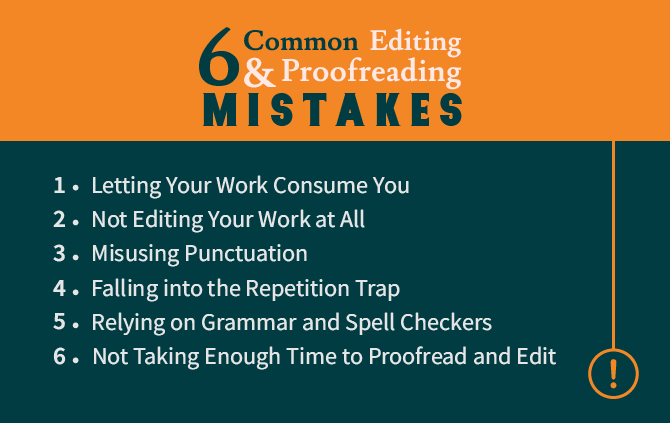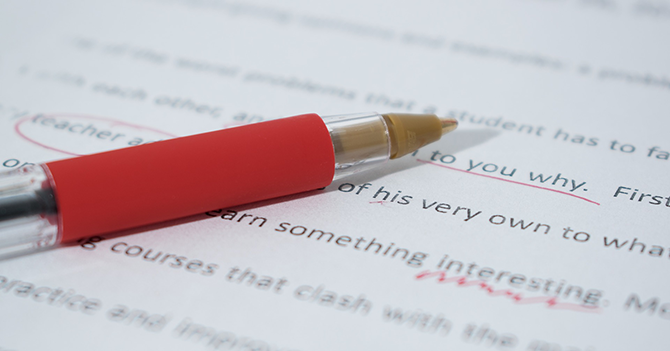6 Common Editing and Proofreading Mistakes
The process of creating, editing and proofreading, then delivering perfect content is challenging for professionals and emerging writers alike, and mistakes happen to even the best among us. Editing and proofreading are especially difficult tasks, as they demand vast knowledge of language and stylistics, and require deep concentration as well.
The responsibility of proofreading and editing your own work can be even more challenging, than doing the same thing for someone else’s writing. Because the challenges are different, be sure to read How to Become an Amazing Self-Editor. Here are six of the most common errors authors make, and what you can do to avoid them in your own work.
1. Letting Your Work Consume You
You’ve been writing for hours, days, or weeks, and now your work is finally done. Eager to finish it all and get some well-deserved rest, you make the number one mistake writers make before checking their writing: you don’t take the time to distance yourself from your work. The result of your efforts is writing that seems quite all right to you, but the readers who get to see your writing for the first time will notice all the mistakes immediately.
What you should do: After your work is done, give it some time before you read it again. Let your mind take its needed rest. The longer your piece of writing (and the longer it took you to make it), the longer your break before proofreading and editing should be.
2. Not Editing Your Work at All
Most writers understand the importance of proofreading, as it ensures your work is good to go in terms of spelling and grammar. However, one of the common mistakes writers make is completely skipping the editing phase. In the editing phase, you analyze and improve the organization and topics covered in your writing.
What you should do instead: Make sure the editing process is part of your plan. Unlike proofreading, editing doesn’t aim for superficial writing errors, but ones that make your writing weak, groundless, or unconvincing. Skipping this phase could hurt the quality of your work, so make sure to take the time to edit every piece you write.
3. Misusing Punctuation
One of the most conspicuous mistakes a writer can make is misusing punctuation in both the writing and proofreading phases. Martha Brooks, a content strategist at A Writer, emphasizes that missing the opportunity to correct these errors can negatively affect your chances of delivering content that can be considered well-written and reliable.
What you should do: Make sure you understand that it’s not only about how your writing looks on the outside. Misusing punctuation can also cause unwanted shifts in the meaning of a sentence or in the tone, so it’s crucial to stay on top of the situation at all times. Research the most common punctuation mistakes, and find out what mistakes you keep on making. Then seek to understand and apply those rules.
4. Falling into the Repetition Trap
Writing for long periods of time on one topic may affect the way you see and experience your work. As you get more comfortable and more familiar with the words and constructions used, the chances of having unwanted repetitions get higher and higher. This is one of the reasons why editing is so important.
What to do instead: Make sure you edit your work when you are rested and refreshed to ensure you stay clear of nasty repetition errors. Once you’ve identified a word or phrase, that you repeat frequently, make use of the search capabilities of your editor (in most cases, CTRL +F) to locate those instances. You’ll be surprised by how many times the word comes up. In some cases, you can eliminate the word entirely. In others, you can replace the duplicates with synonyms.
5. Relying on Grammar and Spell Checkers
It’s always good to know that the internet offers so many useful tools and platforms that can help you check your writing, but relying on them completely is a mistake you should definitely avoid. This may seem like an unnecessary step, but it is, in fact, a really crucial one. Even the best among proofreading checkers cannot cover every phrase, possibility and variant human creativity can produce.
What you should do: Make sure you never forget that these checkers have their limitations, and always proofread your work yourself once more after a checker deemed it perfect.
6. Not Taking Enough Time to Proofread and Edit
Proofreading and editing are demanding processes, and the only way to be sure you’ve done both properly is to take the time you need. Rushing through these phases is the worst thing you can do, so prepare to invest time, patience and concentration into making sure your work looks good.
What you should do: Make sure you exercise your patience by making time in your schedule to edit and proofread your work. However, if you get stuck trying to check your written work properly, it’s good to know that professional editing and proofreading services are always available to you. Do you lack the time or the skills necessary to conduct proper proofreading? Let the experts offer a helping hand.

Conclusion
When it comes to writing, just as with many other things in life if you don’t make mistakes, you don’t learn anything. Errors are a necessary part of any work, but it’s important to know how they happen and what you can do to avoid them. If you want your writing to be grammatically correct and stylistically proper, make sure you stay on the lookout for the aforementioned proofreading and editing traps many writers fall victims of. All it takes is some practice, dedication, and focus, and you will surely learn how to master your words like a pro.
Read these posts.
The Basic Guide to Self-Publishing Ebooks
8 Strange Habits Well-Known Writers Formed to Write Better












